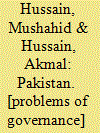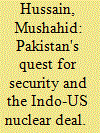|
|
|
Sort Order |
|
|
|
Items / Page
|
|
|
|
|
|
|
| Srl | Item |
| 1 |
ID:
091327


|
|
|
|
|
| Publication |
2009.
|
| Summary/Abstract |
After Pakistan's emergence, the religious bound between the two was reinforced by Pakistani expertise in various sectors of the Saudi Kingdom. For instance, the most trusted financial confidante of King Faisal was none other than Anwar Ali, head of the Saudi Arabia Monetary Agency.
|
|
|
|
|
|
|
|
|
|
|
|
|
|
|
|
| 2 |
ID:
088427


|
|
|
|
|
| Publication |
2009.
|
| Summary/Abstract |
If there is one thing in common between the military dispensation and the present civilian democracy, it is that both started on the right track in Balochistan. Soon after taking over, General Musharraf promised to alleviate the growing sense of deprivation among the smaller provinces and he even offered an apology to the people of Balochistan for "past mistakes." Similarly, President Asif Ali Zardari started off with a public apology to Balochistan and promised to reverse the wrongs of the past, adding that his Baloch roots would reinforce his commitment to that goal. But today, the situation in Balochistan is worse than before and the Baloch insurgency is a throwback to their armed struggle in the 1970s, during Zulfikar Ali Bhutto's tenure.These recurring problems, during different governments, point to a deep-seated mindset which is a major impediment to granting the Baloch their legitimate rights under the 1973 Constitution as equal partners of the federation. The widening credibility gap between Quetta and Islamabad has spawned cynicism and pessimism among the Baloch leadership, who seem to be losing hope in Islamabad's capacity to deliver on their promises.The track record of the federal government
|
|
|
|
|
|
|
|
|
|
|
|
|
|
|
|
| 3 |
ID:
002936


|
|
|
|
|
| Publication |
DelhI, Konark Pub., 1993.
|
| Description |
x,166p.
|
| Standard Number |
812200301X
|
|
|
|
|
|
|
|
|
|
|
|
Copies: C:1/I:0,R:0,Q:0
Circulation
| Accession# | Call# | Current Location | Status | Policy | Location |
| 034397 | 320.95491/HUS 034397 | Main | On Shelf | General | |
|
|
|
|
| 4 |
ID:
002187


|
|
|
|
|
| Publication |
Lahore, Progessive Publisher, 1988.
|
| Description |
339p.
|
|
|
|
|
|
|
|
|
|
|
|
Copies: C:1/I:0,R:0,Q:0
Circulation
| Accession# | Call# | Current Location | Status | Policy | Location |
| 033679 | 327.5491/HUS 033679 | Main | On Shelf | General | |
|
|
|
|
| 5 |
ID:
002250


|
|
|
|
|
| Publication |
Lahore, Progessive Pub., 1990.
|
| Description |
iv,293p.
|
|
|
|
|
|
|
|
|
|
|
|
Copies: C:1/I:0,R:0,Q:0
Circulation
| Accession# | Call# | Current Location | Status | Policy | Location |
| 033680 | 320.95491/HUS 033680 | Main | On Shelf | General | |
|
|
|
|
| 6 |
ID:
070753


|
|
|
| 7 |
ID:
166696


|
|
|
|
|
| Summary/Abstract |
This paper examines methodological avenues for a historical sociology of development through a close reading of Naomi Hossain’s recent book, The Aid Lab: Understanding Bangladesh’s Unexpected Success (2017). Hossain’s conjunctural perspective, the formative moment of Bangladesh in environmental catastrophe, war and famine in the 1970s, establishes a novel account of the country’s development trajectory. Contingencies of the moment and consequent political uncertainties committed an emergent national elite to a largely informal but substantive social compact against future crises of subsistence. The result was a specific, transnational power configuration rendering Bangladesh a test case for developmental interventions and the production of knowledge regarding them. Debates in critical development studies have often posited that such ‘elite commitment’ is a consequence and not so much a precondition for social improvement, brought about through struggles from ‘below.’ How might these positions be reconciled by shifting the temporal frames of reference? By rendering historical processes legible as conflicting and complementary interactions between different social forces and actors? How can such actors be envisaged without presuming their identities and interests as fixed or given, but rather, as shaping and being shaped by such processes? These questions motivate the immanent critique and reappraisal of Hossain’s timely work, highlighting its significance for dynamic analyses of historical capitalism today through the ‘universal particularities’ of the national case.
|
|
|
|
|
|
|
|
|
|
|
|
|
|
|
|
|
|
|
|
|